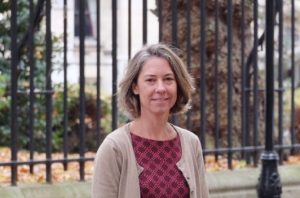How do migrants find their place?
Informal social infrastructure such as cafes and libraries as well as local acquaintances can be important in supporting migrant settlement, according to a leading social anthropologist.
Giving the keynote speech at the recent Welcoming Australia Symposium in Melbourne, researcher Professor Susanne Wessendorf outlined ways migrants in the UK accessed what she termed “arrival infrastructure”.
And she said that often the “place of arrival” was a key to successful settlement.
 “Where someone arrives plays an important role in how migrants settle and in access to resources, especially in low socio-economic areas,” Prof Wessendorf said.
“Where someone arrives plays an important role in how migrants settle and in access to resources, especially in low socio-economic areas,” Prof Wessendorf said.
“The role of existing populations and social networks are important for newcomer and migrant integration. What we are taking about is the bonding and bridging of social capital, said Prof Wessendork of the University of Coventry, in the UK.
She said her research had identified settlement “brokers” and these could include libraries, cafes, barber shops, religious institutions or shops.
“These places can have vital functions as relationship hubs and can be described as “social infrastructure ecosystems,” Prof Wessendorf said.
But she said these ecosystems vary depending on the makeup of the community and that for access to resources for migrants, connections between these ecosystems was important.
Much of Prof Wessendorf’s research was based around Newham, in east London, and Barking and Dagenham, in Essex – highly multicultural communities with a large migrant populations.
“We found that new relationships for migrants were brokered by staff or volunteers at community organisations or faith groups who introduced newcomers to services and resources,” she said.
“For instance, the man running the kiosk at Newham underground railway station told us he considered himself and information booth as well as shop.
“Our research looked at inclusion and exclusion in these areas, which are classical migrant communities that have received newcomers over many decades and have low populations of white, British-born people.”
Prof Wessendorf said barriers to settlement for newcomers in these communities included restrictions on work, limited access to welfare or education, visa arrangements, digital literacy, and English language knowledge.
She said overcoming these barriers often relied on informal relationships and contacts and that these arrangements could sometimes have negative consequences.
Prof Wessendorf told of the case of a Moldovan migrant called ‘Angelica’, who was part of the research project.
“Angelica came to London through a friend already living there. But the friend charged her for sleeping on her floor and also for helping her sign up for national insurance. So we see an example of exploitation here,” she said.
“In the area where Angelica lives there was support available and, importantly, it was visible. She was able to find an English class by walking around.
“Angelica found work as room cleaner in a hotel owned by a fellow Moldovan. But she was treated badly, given twice the work or others and she wasn’t paid.
“While she was sitting on a park bench crying over her predicament, another fellow Moldovan spoke to her and gave her a card with the number of an agency that investigates worker exploitation. She simply showed the employer the card and they paid her,” Prof Wessendorf said.
“So we can see acquaintances, who are not necessarily close friends, can facilitate access to resources for migrants. People on the street can be really crucial; some neighbours told Angelica about affordable accommodation and a Moldovan-speaking doctor in the area.”
Prof Wessendorf said signposting between services and the networking of support organisation were important to settlement outcomes in the UK.
She said her research identified two main factors in successful integration: legal status, and; cultural capital – which included language skills, education and the ability to navigate the system.
“Our research concluded that there was a need to focus on place rather than a particular ethnic group, and it highlighted the role played by the established majority community.
“We also need to integrate the formal and informal arrival infrastructure and enhance the provision of information about formal support. We also concluded that state-funded infrastructure such as libraries were hugely important,” Prof Wessendorf said.
(The UK does not have centralised and case managed humanitarian refugee and migration programs as is the case in Australia.)












